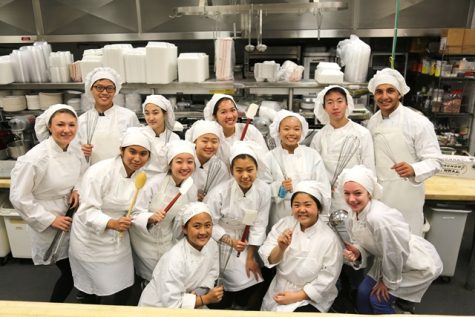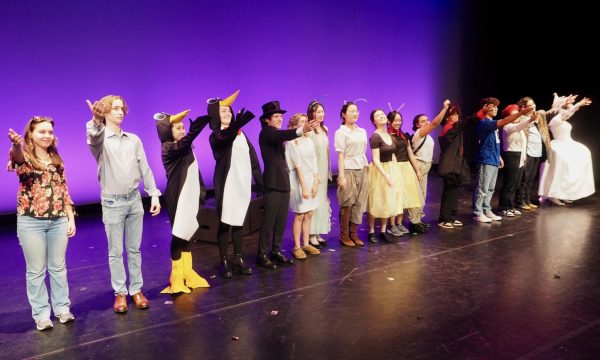A Peek Into the Culinary Academy at BCA
March 29, 2023
The Academy of Culinary Arts and Hospitality, one of the seven academies at BCA, produces well-rounded students ready for employment in the culinary and hospitality fields. Each ACAHA student is trained in a professional kitchen to learn the basics of culinary arts, as well as hotel and restaurant management. Under the guidance of Chef T, students have learned knife skills, ingredient identification, the importance of mise en place, and how to be a leader in the community.
ACAHA is most known for its annual Chocolate Competition and Gingerbread House display, located near the main office during the holiday season. The Chocolate Competition is team-based, where students can utilize their baking skills acquired throughout their training in pastry arts and advanced culinary classes. Culinary students are paired to produce extravagant cakes and cupcakes for judges, who are local chefs, alumni, and other culinary professionals. ACAHA juniors and seniors are the opponents in this competition and are helped by the underclassman, challenging their teamwork and creative abilities.
One of the major components of ACAHA is the way the courses are taught in order to maximize the professionalism that students are exposed to. Culinary students are required to participate in practical tests to assess their expertise in working in a real kitchen. These practical tests include making hollandaise sauce, caesar salad, and a French omelet. Students are required to dress in the same outfit as professional chefs in a real work environment, including an apron and chef coat, pants, hat, and shoes.
“The practical assessments we do in culinary help us build skills for the real world. Whether that be cooking a recipe that we have never tried before or one that we have made many times before, there is always room for the critiques of our teachers,” said ACAHA sophomore Joanna Rydzewski. “They help us learn what we can do to make this recipe even better than before. In the end, we always remember these lessons and tests to better help us improve our culinary skills.” Many students, like Joanna, often feel that practical tests are a more accurate way of evaluating what they have learned, rather than a written test.

Alongside practical tests, students have several different identification tests, including for lettuces, spices, and herbs. In their salad unit, they must be able to understand the different parts of a salad, as well as identify lettuces with their names and usages. During freshman year, they must also be able to recognize different spices and herbs that are commonly used in the kitchen, furthering their preparation for working in a real restaurant establishment. Through these tests, the teachers are ensuring that students will eventually be able to smoothly work in a kitchen and impress their future employers with culinary knowledge that other children their age may not know.
“The culinary academy’s spice test, taken as a freshman, was one of the many steps I am taking for pursuing a career in the culinary field after school. In class, we learned how to identify spices purely on taste and appearance,” said ACAHA sophomore Olivia Adams. “While at the time it seemed unlikely that I would have to identify spices without the labels in the professional world, I realized learning to identify spices is an important skill for me in my future. After taking this test, I now know what dishes and cuisines utilize these different spices and am prepared for professional kitchen jobs and other cooking experiences.”
The skills taught within ACAHA students’ four years at BCA are essential for the high-pressure situations they will encounter as they become professionals. Even though the culinary academy is a fast-paced environment, the academy prides itself on its true family connection and the support they provide for one another.
Bella Pasongrica, an ACAHA student, agrees that her academy has created a warm community: “I enjoy working in the culinary arts and hospitality program because I have the opportunity to learn about various cooking techniques and cuisines, as well as cook with friends I have become close to in the kitchen. In addition, I find that hands-on activities such as the chocolate competition have helped me grow my culinary and teamwork skills.”
ACAHA is an exceptional academy that emphasizes both culinary arts and the importance of being hospitable and leading by example. This academy is significant for its help in catering events, fundraising at BCA, and its hardworking and dedicated community of students.














